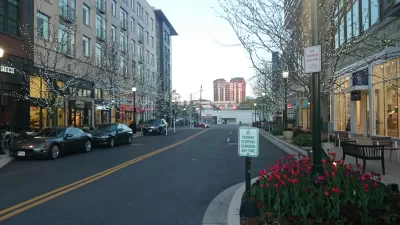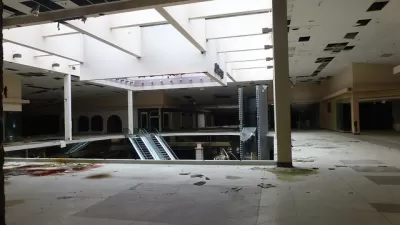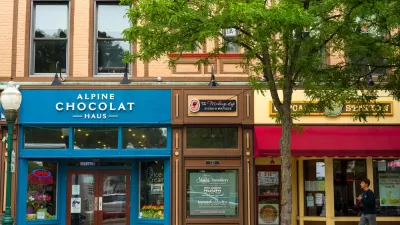Live music, skating rinks, and artificial beaches are now part of developments that want to go beyond just simple shopping and dining.

Katherine Shaver reports that developers are focusing on "experience" as a draw for residents and visitors. "It’s the latest buzzword among developers seeking to transform automobile-centric inner suburbs into walkable urban hubs."
Developers say they also want to encourage environments that help people interact offline, where they can connect while also supporting brick-and-mortar retail establishments, says Shaver:
It’s why you’re seeing so many more restaurants, food halls, cooking demonstrations, outdoor yoga classes, smaller concert venues, bars and lounges, farmers markets, tot lots, fire pits, splashable fountains, restaurant-like bowling alleys, and cocktail-serving movie theaters — anything that helps people interact in a way they can’t online.
These experiences, however, are not completely disconnected from the digital world. "The most successful offerings, developers say, are ready-made for Instagram, Facebook and Snapchat," adds Shaver.
Shaver notes that not all efforts have proven successful. Some developments have competed with other projects, struggled with commercial vacancies, and faced the effects of growths in online shopping.
FULL STORY: Why developers are offering ‘experiences’ to attract suburbanites

Maui's Vacation Rental Debate Turns Ugly
Verbal attacks, misinformation campaigns and fistfights plague a high-stakes debate to convert thousands of vacation rentals into long-term housing.

Planetizen Federal Action Tracker
A weekly monitor of how Trump’s orders and actions are impacting planners and planning in America.

In Urban Planning, AI Prompting Could be the New Design Thinking
Creativity has long been key to great urban design. What if we see AI as our new creative partner?

King County Supportive Housing Program Offers Hope for Unhoused Residents
The county is taking a ‘Housing First’ approach that prioritizes getting people into housing, then offering wraparound supportive services.

Researchers Use AI to Get Clearer Picture of US Housing
Analysts are using artificial intelligence to supercharge their research by allowing them to comb through data faster. Though these AI tools can be error prone, they save time and housing researchers are optimistic about the future.

Making Shared Micromobility More Inclusive
Cities and shared mobility system operators can do more to include people with disabilities in planning and operations, per a new report.
Urban Design for Planners 1: Software Tools
This six-course series explores essential urban design concepts using open source software and equips planners with the tools they need to participate fully in the urban design process.
Planning for Universal Design
Learn the tools for implementing Universal Design in planning regulations.
Appalachian Highlands Housing Partners
Gallatin County Department of Planning & Community Development
Heyer Gruel & Associates PA
Mpact (founded as Rail~Volution)
City of Camden Redevelopment Agency
City of Astoria
City of Portland
City of Laramie





























